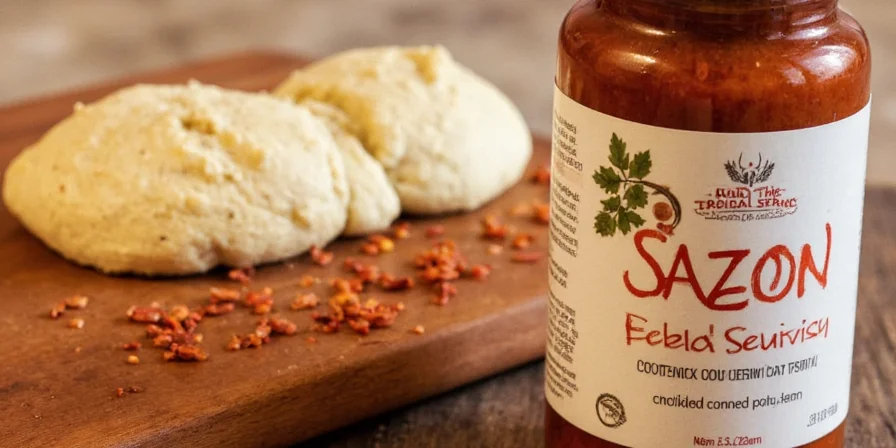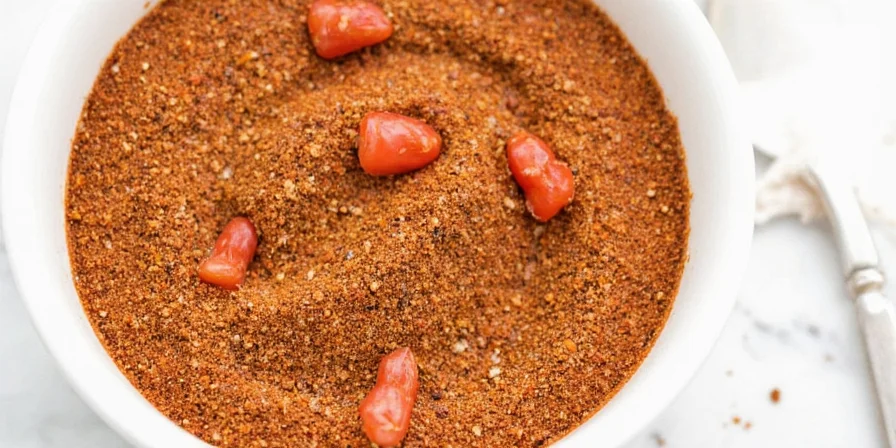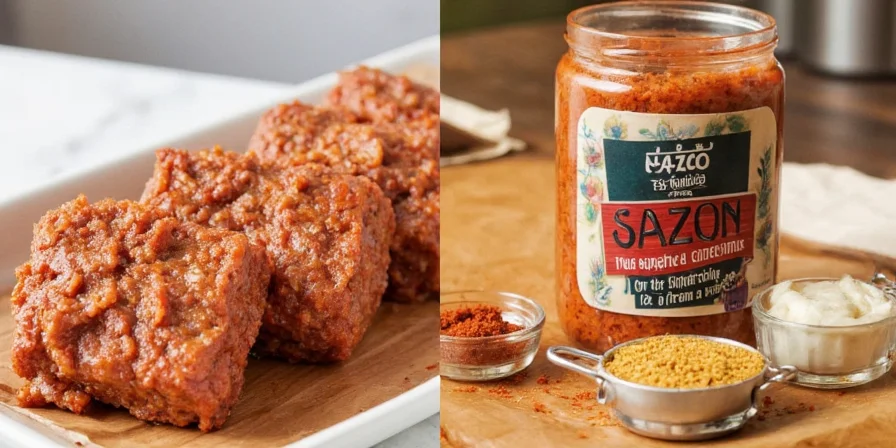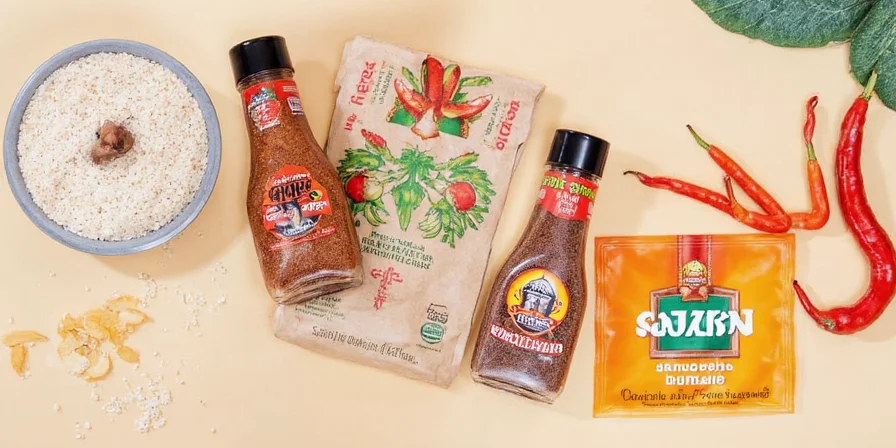Sazon seasoning is a vibrant Latin American spice blend primarily known for its distinctive yellow-orange color from annatto seeds. If you've ever wondered 'what is sazon seasoning exactly,' this guide delivers precise answers: it's a flavor foundation used across Latin American cooking that combines annatto, cumin, coriander, garlic, and other spices to create dishes with authentic color and depth. Here's what most home cooks need to know immediately - 1 teaspoon of sazon per pound of meat or 2 cups of rice delivers perfect flavor without overpowering, and it's essential for authentic arroz con pollo, beans, and stews.
Table of Contents
- What Is Sazon Seasoning? Your Quick Reference
- Sazon Ingredients Breakdown: What's Really in That Packet
- Sazon vs Adobo vs Recado Rojo: Key Differences Explained
- How to Use Sazon: 5 Proven Techniques That Work
- Regional Sazon Variations: Puerto Rican, Dominican, Mexican Styles
- Sazon Storage Tips and Substitutes That Actually Work
- Sazon Questions Answered: What Most Guides Miss
What Is Sazon Seasoning? Your Quick Reference
Sazon (pronounced sah-son) is a ready-to-use seasoning blend central to Latin American cooking, most recognized by its signature yellow-orange hue from annatto seeds. Unlike generic spice mixes, authentic sazon serves two critical functions: flavor enhancement and visual identification. The name comes from the Spanish word for 'seasoning' or 'the right moment' when flavors achieve perfect harmony in cooking.
Understanding these two fundamental sazon types solves most home cooking problems:
- Dry Sazon: Best for dry-heat applications and extended marination (2-3 hours). Use when you want consistent flavor penetration without added moisture.
- Wet Sazon: Contains oil base for rapid flavor transfer. Ideal for quick marinades (30-60 minutes) and high-heat cooking where dry spices might burn.

Sazon Ingredients Breakdown: What's Really in That Packet
While commercial sazon maintains standardized formulations, understanding the core components helps you use it effectively. The following analysis reveals how each ingredient functions in your cooking:
| Core Ingredient | Primary Function in Cooking | Practical Impact on Your Dishes |
|---|---|---|
| Annatto (Achiote) | Color agent & subtle earthiness | Provides signature yellow-orange hue; contributes mild earthy notes that deepen when heated |
| Cumin | Warm, earthy foundation | Dominates Caribbean versions; use extra for heartier meats like beef or pork |
| Garlic Powder | Umami enhancement | Higher concentration in Mexican styles; avoid burning by adding with oil |
| Coriander | Citrusy counterbalance | Essential in Puerto Rican recipes; balances annatto's earthiness |
| Paprika | Color reinforcement & mild sweetness | Smoked varieties in coastal regions; sweet paprika inland for subtle flavor |
| Salt & Pepper | Flavor amplifier & balance | Adjust final seasoning after cooking - sazon already contains significant salt |

Sazon vs Adobo vs Recado Rojo: Key Differences Explained
Confused about how sazon compares to similar Latin seasonings? This comparison shows exactly when to use each:
| Seasoning | Best For | When to Use | Key Warning |
|---|---|---|---|
| Sazon | Rice, beans, stews | When you need color AND flavor foundation | Don't add directly to hot oil - mix with liquid first |
| Adobo | Meat marinades | Surface flavoring before grilling or roasting | Contains more salt - reduce added salt elsewhere |
| Recado Rojo | Specialty dishes | Traditional Mayan recipes like cochinita pibil | Stronger annatto flavor - use 25% less than sazon |
| Soofrito | Soup bases | Fresh vegetable flavor foundation | Not a dry spice - can't substitute for sazon 1:1 |

The critical difference most guides miss: sazon's annatto doesn't just add color - it creates new flavor compounds when heated with oil. This chemical reaction (called the Maillard reaction) develops flavors you can't achieve by adding individual spices separately.
Regional Sazon Variations: Puerto Rican, Dominican, Mexican Styles
Commercial sazon brands like Goya have standardized the blend, but traditional preparations vary significantly by region. Knowing these differences helps you match authentic flavors:
- Puerto Rican sazon: Features prominent coriander and culantro with moderate annatto. Best for rice dishes and seafood. Look for "Sazón con Azafrán" (contains no actual saffron despite the name).
- Dominican sazon: Stronger garlic presence with balanced annatto. Essential for habichuelas (beans) and sancocho (stew). Often includes oregano.
- Mexican sazon: Higher cumin content with subtle garlic. Used in arroz rojo and certain mole preparations. Often contains chili powder.
Coastal regions typically use more annatto for visual appeal in seafood dishes, while inland areas focus on deeper spice flavors for heartier meats. The proportion of annatto to other spices serves as a regional identifier - higher annatto means stronger Caribbean influence.
How to Use Sazon: 5 Proven Techniques That Work
Avoid common mistakes with these science-backed application methods:
1. The Rice Perfection Method
Add sazon during the sofrito stage (when cooking onions, peppers, and garlic in oil), NOT directly to rice. This releases oil-soluble annatto compounds properly. Use 1 teaspoon per cup of uncooked rice for perfect color and flavor.
2. Protein Marination Formula
Combine 1 tablespoon dry sazon with 2 tablespoons citrus juice (lime for Mexican, orange for Caribbean) per pound of meat. Marinate 2-3 hours for chicken, 4-6 hours for tougher cuts like pork shoulder.
3. The Two-Stage Bean Technique
Add half your sazon when beans hit a rolling boil, then the remainder in the last 15 minutes of cooking. This preserves volatile compounds that would otherwise evaporate during prolonged simmering.
4. Temperature Control Guide
Wet sazon: Use for high-heat methods (searing, grilling) - the oil base prevents burning Dry sazon: Best for moderate heat (baking, slow cooking) where direct spice contact enhances flavor
5. Bitterness Prevention Strategy
Mix sazon with 1 tablespoon oil before adding to dishes. This prevents direct contact with hot surfaces that causes annatto to become bitter. If bitterness occurs, add 1 teaspoon acid (vinegar or citrus) to neutralize.

Sazon Storage Tips and Substitutes That Actually Work
Extend sazon's shelf life and handle shortages with these practical solutions:
- Preservation method: Store in opaque glass container away from light. Properly stored, commercial sazon lasts 6 months (not the 3 months many suggest).
- Homemade substitute: Mix 2 tsp annatto powder + 1 tsp cumin + 1 tsp garlic powder + 1 tsp coriander + 1/2 tsp paprika + 1 tsp salt. Use immediately for best results.
- Emergency substitute: For color: 1/4 tsp turmeric + extra paprika. For flavor: 1 tsp taco seasoning + pinch of saffron (not traditional but functional).
- When to avoid substitutes: Authentic arroz con pollo, pasteles, and habichuelas require real sazon - substitutes won't deliver the distinctive flavor-color combination.
- Salt adjustment: Since sazon contains significant salt, reduce added salt by 25% in recipes.

Sazon Questions Answered: What Most Guides Miss
What is sazon seasoning made of?
Authentic sazon contains annatto (for color), cumin, coriander, garlic powder, oregano, salt, and sometimes paprika or chili powder. Commercial versions like Goya may include msg and artificial colors. The signature yellow-orange color comes from annatto seeds, not food coloring.
Is sazon the same as taco seasoning?
No. Sazon contains annatto as its primary ingredient for color and earthy flavor, while taco seasoning focuses on chili powder and cumin for heat. Sazon provides distinctive yellow-orange color that taco seasoning lacks. Use sazon for Latin rice dishes and beans, taco seasoning for Mexican-inspired ground beef dishes.
Why does my sazon make food bitter?
Bitterness occurs when sazon's annatto compounds burn. Never add dry sazon directly to hot oil - always mix with liquid first or combine with 1 tablespoon oil before adding to the pan. If bitterness happens, add 1 teaspoon acid (citrus or vinegar) to neutralize the compounds.
How much sazon per pound of meat?
Use 1 teaspoon of dry sazon per pound of meat for balanced flavor. For wet sazon or stronger commercial blends, use 3/4 teaspoon. For rice dishes, use 1 teaspoon per 2 cups uncooked rice. Always adjust based on your brand's intensity - taste as you go.
Can I use sazon instead of adobo?
Not directly. Adobo has more garlic and salt with no coloring agents. If substituting sazon for adobo, use 75% of the amount and reduce added salt by 25%. The dish will have distinctive color but similar savory profile. For best results, combine 3 parts adobo with 1 part sazon.
Mastering Sazon: Your Path to Authentic Latin Flavors
Understanding sazon goes beyond just following recipes - it's about respecting the cultural tradition while applying practical cooking science. By using the right type for your dish, applying it at the correct cooking stage, and respecting regional variations, you'll achieve authentic results that honor the tradition. Remember the golden rule: sazon should enhance, not dominate - when used properly, it creates that 'something special' in Latin dishes that's hard to identify but impossible to miss when it's absent.











 浙公网安备
33010002000092号
浙公网安备
33010002000092号 浙B2-20120091-4
浙B2-20120091-4